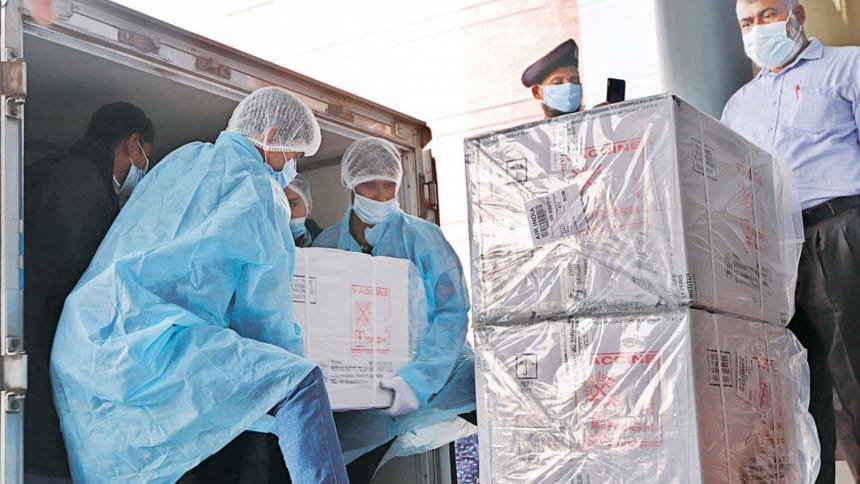Are we ready to implement our vaccination plan?

The government has recently unveiled a national plan for vaccination against Covid-19. It has set the target of giving two vaccine doses to each of 130 million people to protect them from the deadly virus. According to the plan shared by the ruling Awami League on its verified Facebook page, the vaccine will be distributed in three phases divided into five stages based on priority. A total of about 1,72,81,000 people will be inoculated in the first two stages of the first phase. In the second phase, 1,72,80,000 people will be vaccinated, while the rest of the eligible persons will get their shots in the third and final phase. During the first stage of the first phase, a total of over 51,84,000 people including health workers and health assistants, freedom fighters, members of the law enforcing agencies and armed forces, government officials, frontline journalists, public representatives, officials and other employees of city corporations and municipalities as well as funeral workers will get the vaccine.
Prime Minister Sheikh Hasina virtually inaugurated a pilot vaccination drive on January 27 at Kurmitola General Hospital. The nationwide vaccination programme will kick off on February 7.
To start with, it looks very unusual that a government plan was unveiled by the ruling party through a Facebook page and not by any government agency and not through an official circular. The government is, of course, duty-bound to implement the agenda of the political party in power. This, however, does not mean that the party should act as an organ of the government. It is important that the activities of the government and the party in power do not get mixed up.
Several questions also come up: While the government was planning to start the immunisation programme in late January or early February, why did it wait so long to unveil plans for the programme now? Normally, it is easy to make a plan on paper but very difficult to implement it in practice. Have they done all the homework necessary for launching the programme?
There are several issues that need to be taken into consideration. First, it is gratifying to note that, as per a declaration of the prime minister in parliament on January 27, the priority list also includes a vulnerable group consisting of elderly people and those with poor immunity or suffering from serious chronic diseases. While the government may already have in possession a list of the other people in the priority list, it is necessary to prepare a fresh list of the vulnerable group on an emergency basis.
Second, it is believed that a large number of the population suffered from Covid-19 without showing any symptom and without their knowledge, as they did not go for testing. They may have antibodies of the virus present in their blood. Will they be vaccinated without any antibody test? Moreover, the policy on inoculation of confirmed Covid-19 patients has not been made clear yet.
Third, at the vaccination centres, there may be some people suffering from asymptomatic cases of Covid-19 and they may spread the virus without their knowledge. What precautions will be taken to protect the healthy people at vaccination centres from possible infections by asymptomatic carriers? It is expected that everyone will wear masks and maintain physical distancing at the centres. It is also necessary to disinfect every chair and piece of furniture after use so that no one gets infected. It is equally essential to maintain a proper hygienic condition and clinical cleanliness there. The vulnerable group, as mentioned above, needs special care during vaccination. It would be advisable to vaccinate them at their houses, if possible, for their safety.
Fourth, a complicated process has been developed for registration for vaccines by the general public. For registration, all citizens will first need to download an app on their mobile phones from Google's Play Store or Apple's App Store. They can also get registered on a website from any device. They will need to provide necessary information such as NID number, date of birth and mobile phone number. They will also need to provide health information such as if they are suffering from diabetes, high blood pressure, cancer or kidney complications, or if they have been infected by the coronavirus. They will be required to confirm if they were involved in the Covid-19 fight directly. The authorities will then choose the vaccination centre for a citizen based on his/her current address. Once the process is completed, the citizen will get an SMS confirming the registration.
The applicant can then download the registration card anytime with a one-time password sent to his/her phone. This card must be shown to the authorities while taking the shot. To keep a record of immunisation, it is suggested that this card is sealed and signed with dates by an authorised person while the citizen receives each dose of the vaccine. Those who will not be able to register online or through the app will need to visit a hospital for registration.
The problem is, the majority of the population is unfamiliar with online transactions of business, so the number of online registrations is also likely to be small. This means that the main pressure for registration will fall on the hospitals listing people manually. Are they equipped to handle such a situation? Do they have any experience of this kind? As a matter of fact, the process of registration should have started long ago and the task of manual registration should have been given to Bangladesh Armed Forces who had previously successfully prepared the voters' list and issued the National ID cards in 2008. They have the experience and expertise to do this job most efficiently. It is not too late to involve them even now.
For this purpose, multiple booths need to be set up in schools, colleges and community centres in each locality, and people with computer literacy should be employed at each booth to prepare the list. Local councillors should cooperate with the enlisters to make sure every eligible person in his/her locality is included in the list. Here again we need to follow the safety rules strictly so that we do not inadvertently spread the virus during manual registration.
Lastly, we must remember that to inoculate 130 million people, we need 260 million doses of vaccine. So far, we've purchased only 30 million doses from India and received another two million doses as gift from them. This constitutes only 12.3 percent of our total requirement. We must ensure the supply of the rest of the doses on time. It is important that the whole programme proceeds according to a set procedure and without any political or bureaucratic interference. Any deviation from the set rules will only create discontent among the public and this may interrupt the whole programme. If we have a realistic plan and execute it properly, there is no reason why it should fail. This is a war against a deadly, invisible enemy. We must, therefore, act on a war footing. If other countries in our region can do it, so can we.
Dr Abdul Matin is a retired nuclear engineer and a former Professor of Dr. Rashid Chair at BUET.

 For all latest news, follow The Daily Star's Google News channel.
For all latest news, follow The Daily Star's Google News channel. 



Comments